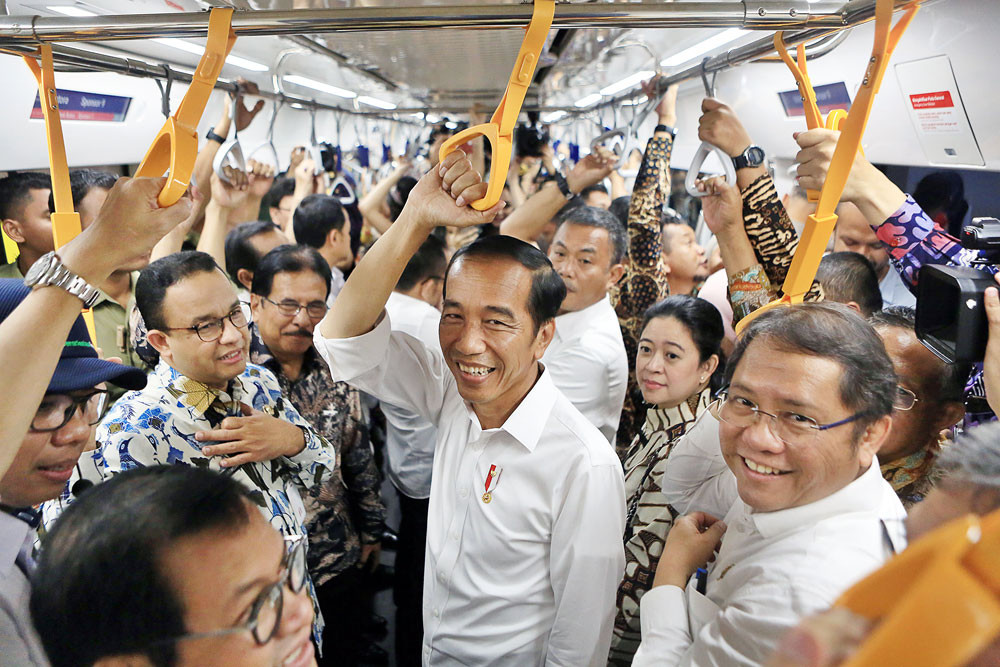Popular Reads
Top Results
Can't find what you're looking for?
View all search resultsPopular Reads
Top Results
Can't find what you're looking for?
View all search resultsComplementarity key to Japan-Indonesia sustainable relations
COVID-19 has stopped the flow of people, businessmen as well as tourists, but it hasn't stopped the flow of our friendship and the spirit of mutual cooperation.
Change text size
Gift Premium Articles
to Anyone
J
apanese Ambassador to Indonesia Masafumi Ishii is completing his tenure, during which he helped deliver a number of major milestones in the relations between the two countries. He received The Jakarta Post’s Dian Septiari on Monday to discuss these achievements. The following are excerpts of the interview.
Question: What have Indonesia and Japan achieved together after more than 60 years of relationship?
I think we have many things, like infrastructure building. While I have been here, the MRT was launched after many years. We are about to soft-launch Patimban Port, while discussion is ongoing for the Jakarta-Surabaya railway and all the other infrastructure projects.
I think the economic relations between the two countries have become much closer in terms of vocational training, more investment and more exports from Japanese factories here, which is a gain for Indonesian economy.
The understanding or recognition of the importance of our relations is much higher now, and I think that is the key for the future. Of course, the economic figures can change, with COVID-19 there are ups and downs, but I think as long as we maintain our focus on the relations, a better future is promised.
COVID-19 has changed many things but how have the relations between Japan and Indonesia evolved this year?
There is obviously a lot of cooperation between the two countries to combat COVID-19 challenges, as no country is free from the challenge of COVID-19.
So, we have done a lot of cooperation, we supply some medicines, medical equipment like ventilators, PCR kits and so on and so forth through bilateral or multilateral organizations such as WHO [World Health Organization] or UNDP [United Nations Development Programme].
We have also extended some assistance to keep the economy going, we have committed a loan worth US$10 billion to cover the deficit.
I think COVID-19 stopped the critical flow of people, businessmen as well as tourists, but it didn't stop the flow of our friendship and the spirit of mutual cooperation, so I think we have done a lot to overcome the COVID-19 situation.
Japan and Indonesia have shared their perspectives in the Indo-Pacific concepts, with Japan proposing the Free and Open Indo-Pacific (FOIP) and Indonesia the ASEAN Outlook on Indo-Pacific (AOIP). What can the two countries do to translate those principles into action?
The concepts are important, the AOIP and the FOIP are important, and they share most of the same concepts. Having said that, the more important thing is to do what we have to do, and these concepts may justify it but we are not doing it for the concepts per se.
I think these concepts are based on the sheer fact that these two oceans are connected, and you need to see things throughout export, trade throughout the region. In terms of security, what happened in the Pacific can happen in Indian Ocean so you need the freedom of navigation. Safety of navigation has to be [ensured] throughout the region, so that these two bases for economic progress are interconnected well. As simple as that, we don’t really need the name to call it.
From that viewpoint, I guess for Indonesia, if you are better connected not only among ASEAN but also with important players in the region, such as India, I think that means better connectivity, better flow of things, better supply chains. I do see sign of growing cooperation between India and Indonesia for regional development, particularly, for example, in the area of Sabang.
Japan happens to have committed to developing a fish port in Sabang, where we interact not only with the Indonesian government but also Indian government. This is a typical example of Japanese efforts to increase connectivity, make supply chains more connected throughout the region.
Another example is Natuna Islands, which has a little bit of a security issue, but also Natuna is located in a very nice way in an area where you have a lot of fishing and fishery capability. And transportation wise, Natuna is very close to Japan. Natuna is somewhere between Japan and Indonesia, so is Morotai.
Japan has also been developing the fish ports in what we called remote islands because we do believe that the development in those regions is important not only for the security of Indonesia, but also for the sake of development of the region and the reduction of the gap amongs the regions.
What should the next ambassador of Japan to Indonesia remember to ensure good bilateral relations?
First, Indonesia has a huge potential, it's a big, young country. It will grow, perhaps bigger than Japan. So Japan needs to understand that first.
Second, we have a huge potential for further cooperation, simply because our relations are so complementary and this situation will continue. There are many things we can do, not only the economy, but also cooperation in security, border control, and so on.
Based upon these recognitions, you have some cornerstones on the timeline in the near future and make the best of them. One of which comes in 2023, your ASEAN chairmanship, the 65th anniversary of diplomatic ties between Japan and Indonesia, the 50th anniversary of Japan-ASEAN cooperation and there will be a visit of the Japanese prime minister.
We have more than two years from now. Bringing the relations to an even higher level, that is the utmost important job my successor will do.










